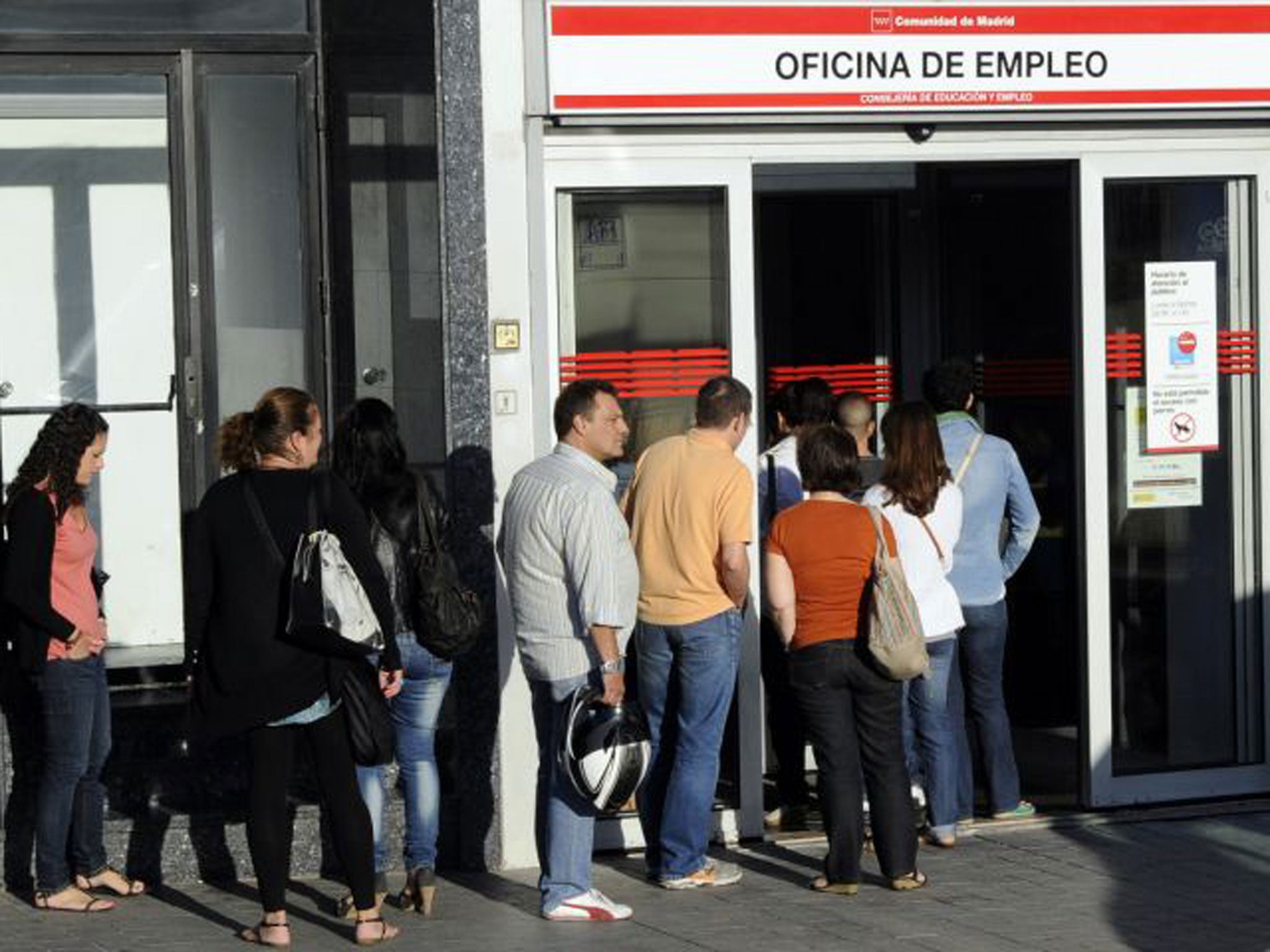Spain’s jobless rate soars to a record high of 27.16 per cent
In nearly two million homes, every adult is out of work – with no end of recession in sight

Your support helps us to tell the story
From reproductive rights to climate change to Big Tech, The Independent is on the ground when the story is developing. Whether it's investigating the financials of Elon Musk's pro-Trump PAC or producing our latest documentary, 'The A Word', which shines a light on the American women fighting for reproductive rights, we know how important it is to parse out the facts from the messaging.
At such a critical moment in US history, we need reporters on the ground. Your donation allows us to keep sending journalists to speak to both sides of the story.
The Independent is trusted by Americans across the entire political spectrum. And unlike many other quality news outlets, we choose not to lock Americans out of our reporting and analysis with paywalls. We believe quality journalism should be available to everyone, paid for by those who can afford it.
Your support makes all the difference.For the first time since modern statistics began, Spain reached the landmark figure of more than six million unemployed – or 27.16 per cent of the working population. And it did so with a vengeance, with a jump of 237,400 in the first quarter of 2013 to a record high of 6,202,700.
Whichever way you look at them, the figures are spine-chilling: youth unemployment is running at 57 per cent; the jobless rate has risen by a shade under 20 percentage points since Europe’s fourth-largest economy began plunging into the worst recession in 50 years in late 2007.
In nearly two million Spanish households, every adult is out of work. Even before the latest jobless figures, 22 per cent of Spaniards were living below the poverty line, according to the Catholic charity Caritas, and another 30 per cent had a hard time financially making it to the end of the month.
“There is nothing: no work for older people, younger, whoever,” says Cristina Moya, 24, a former cleaner who has just lost her job for a second time. She lives in Andalusia – the region which saw the biggest rise in unemployment this spring, by 31,100.
“My two sisters, boyfriend and sister-in-law are all out of work,” adds Ms Moya. “And the situation is getting worse, not better. I don’t know a single family that’s not affected.”
“We’re thinking of heading to Canada, or wherever we can,” says Jose Miguel, 30, a builder from southern Spain. “But the problem is wherever you want to go, you have to have a stash of money to start off with, and nobody’s got that. It’s better to stay with the family where you are a bit safer.”
“Even if you get a job, what is worse is they just harden up the working conditions dramatically,” adds Ms Moya. “They say that if you don’t want the job, there are loads of people out there who will take it.”
Other knock-on effects include a return to the emigration of the 1960s and 1970s. In January, Spain recorded its first population decline in 17 years – by 200,000 people. Language schools are that rarest of phenomena right now – a boom industry.
A continuous recession lasting 21 months has led to huge numbers of mortgage defaults: about 400,000 mostly residential properties have been repossessed and tens of thousands of Spaniards have received eviction orders. Meanwhile, a 30.4 per cent drop in property prices since 2007 has left many owing more than their homes were originally worth. Savings levels have dropped to their lowest in 13 years, and 52 per cent of 17- to 34-year-olds still live with their parents.
It is true that, while politicians’ promises that the end of the recession is just around the corner sound increasingly hollow (the International Monetary Fund, for one, does not believe them, and predicts that Spain’s economy will shrink by 1.6 per cent this year), and support for the major political parties has slumped to less than 50 per cent of the total vote, protests have by no means reached the levels of violence seen in Greece.
However, there are growing fears of a repeat of the scenes at one major anti-austerity protest in Madrid last September, which concluded with running street battles between police and demonstrators, and dozens of injuries and arrests.
Last night, a handful of radical left-wing splinter groups was planning to hold a “Besiege Congress” rally, with the aim of “toppling the government and the fall of the regime”.
… and France is in trouble, too
In a significant blow to President François Hollande, unemployment in France has risen to a record 3,225,000. If part-time working is included, the number of people on state assistance has reached five million.
March saw the 23rd successive monthly rise in unemployment, bringing the total of job-seekers without work of any kind beyond the record of 3,195,500 set in January 1997. In percentage terms, joblessness is expected to reach a new high of 11 per cent by the autumn.
John Lichfield
Join our commenting forum
Join thought-provoking conversations, follow other Independent readers and see their replies
Comments